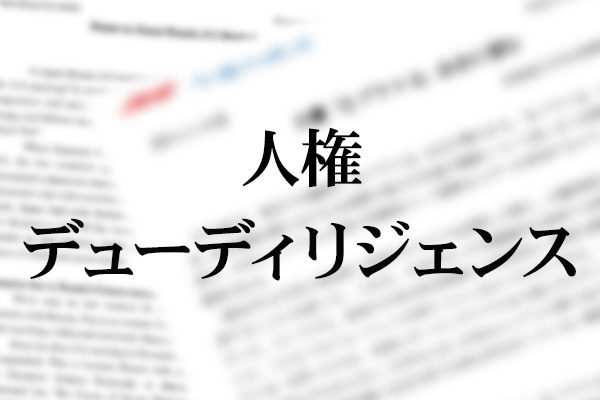The ruling Liberal Democratic Party is seemingly considering a recommendation on “human rights and business.” Media reports say that the recommendation would focus on human rights due diligence for companies to check, prevent and respond to human rights abuse risks at their trading partners, with human rights conditions in the Xinjiang Uyghur autonomous region and other places in China in mind.
Europe is moving to make human rights due diligence obligatory. The Japanese government may also have to develop human rights due diligence guidelines to promote companies’ relevant efforts. I have no objection to the direction. But, instead of paying attention to human rights due diligence alone, the government should multidirectionally consider how to protect Japanese companies from human rights risks.
U.S. and China may arbitrarily enforce laws
Japanese companies are now facing great risks. The U.S. Uyghur Forced Labor Prevention Act enacted late last year basically bans all imports from Xinjiang for the reason of forced labor. It requires companies to provide the devil’s proof that no forced labor is used for producing the products. Japanese companies that export products to the United States are required to check their wide-ranging supply chains. A serious problem is that the U.S. operations are opaque and unpredictable. In a typical case, the U.S. customs blocked a shipment of Uniqlo shirts last year under the act.
China for its part is prepared to counter the U.S. act with its Anti-Foreign Sanctions Law. If Japanese companies voluntarily sever business transactions with Chinese firms on human rights abuse concerns, they could become subject to Chinese sanctions. Japanese companies are thus sandwiched between the devil and the deep blue sea.
The Japanese government should take measures to protect Japanese companies from the potentially arbitrary enforcement of such laws in the United States and China. Human rights due diligence should be considered in this context. The government should negotiate with Washington to clarify enforcement criteria. But that alone is not enough.
Export controls for human rights abuse reasons
It is important for the government to launch export controls. The Group of Seven industrial democracies at their summit last year agreed to take joint actions to eliminate forced labor from international supply chains, citing trade policy as a key means for the elimination. Western countries have already taken trade policy measures including export controls. Among the G7 countries, only Japan has yet to do so.
Furthermore, the United States launched the Export Controls and Human Rights Initiative at the democracy summit sponsored by U.S. President Joe Biden last December. It and like-minded countries will develop a code of conduct for export controls.
The problem is that Japan is not among the countries that expressed support for the initiative. Japan should join the talks by like-minded countries as a responsible partner, instead of an observer.
Japan’s foreign ministry is negative about imposing export controls for human rights abuse reasons, apparently concerned that such export controls would provoke China. But export controls, differing fundamentally from sanctions, do not call China or any other specific country by name. Export controls for human rights abuse reasons are similar to the existing controls for national security reasons in regard to this point.
The abovementioned LDP recommendation is likely to focus on companies’ human rights diligence. If the government provides criteria for such due diligence and leaves companies to decide what to do, however, they may have to take a risk of being sandwiched between the United States and China. To avoid such risk, the government is required to make decisions. It would be irresponsible for the government to refrain from making decisions while requiring companies to bear the burden of human rights due diligence and make decisions.
If taking a serious view of risks facing companies, the government should comprehensively consider human right due diligence and link it to export controls.
Masahiko Hosokawa is a professor at Meisei University and a former director-general of the Trade Control Department at Japan’s Ministry of Economy, Trade and Industry. He is also a Planning Committee member at the Japan Institute for National Fundamentals.


